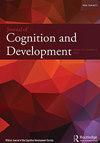A Review of “How You Say it”
IF 1.6
2区 心理学
Q3 PSYCHOLOGY, DEVELOPMENTAL
引用次数: 0
Abstract
Learning to communicate in one’s native language(s) is one of the most impressive accomplishments of the first few years of life. Developmental scientists have extensively detailed and debated how children accomplish this feat, recognizing that language acquisition is both an amazing developmental achievement (on its own) and foundational to the rest of the cognitive development – including to conceptual development, knowledge acquisition, memory, and education. Yet, despite all the attention the field has paid to language acquisition and its role in development, Katherine Kinzler’s comprehensive and beautifully written book, How You Say It, argues that we have largely overlooked one critical consequence – that learning one’s native language provides a fundamental sense of identity and lens for making sense of the social world. Kinzler builds this argument drawing from her own empirical work in developmental science and research from other subfields of psychology, as well as from an interdisciplinary perspective informed by sociology, linguistics, history, evolutionary biology, education, and law. Kinzler describes compelling evidence that children’s social responses are shaped by whether a potential social partner speaks like they do (in terms of language and accent). By five months, babies prefer to look at people who speak their native language or with a native accent (Kinzler, Dupoux, & Spelke, 2007). By 10-months, they prefer to take a toy from someone they previously saw speak in their native language (Kinzler, Dupoux, & Spelke, 2007), and expect people who speak the same language to affiliate with one another and have other things (e.g., food preferences) in common, but people who speak different languages to disengage from one another and have other differences (Liberman, Sullivan, Woodward, & Kinzler, 2016). By early childhood, these biases are explicit – children prefer to learn (even non-linguistic information) from people who speak their native language with their native accent (Kinzler, Corriveau, & Harris, 2011), explicitly say they would rather be friends with someone who speaks with their native accent (Kinzler, Shutts, DeJesus, & Spelke, 2009), and begin to endorse language-based stereotypes (e.g., about who is nicer or smarter; Kinzler & DeJesus, 2013). Kinzler argues that these finding stem from a basic tendency for people (including young children) to notice who speaks like them and treat this as a marker of who is in or out of their group. From this perspective, children’s differential treatment and responses to people who speak differently from them are not only about ease of communication; instead, sharing a native language fundamentally marks whether we see someone as like us or not. A range of controls supports the conclusion that the social effects of language are not reducible to ease of communication alone: children’s biases appear just as strong based on accent (when they can still understand the content of what someone is saying) as based on language (when they can’t); children’s biases show up even in non-linguistic contexts (e.g., babies prefer to look at people who speak their native language even when they are silent, and children prefer to learn how to use tools from people who speak with their native accent even if the tool demonstration is presented without language).《How You Say it》书评
学会用母语交流是人生最初几年最令人印象深刻的成就之一。发展科学家对儿童如何完成这一壮举进行了广泛的详细讨论和辩论,他们认识到语言习得既是一项惊人的发展成就(本身),也是认知发展的基础——包括概念发展、知识获取、记忆和教育。然而,尽管这个领域对语言习得及其在发展中的作用给予了所有的关注,凯瑟琳·金兹勒(Katherine Kinzler)写得全面而优美的《你怎么说》(How You Say It)一书认为,我们在很大程度上忽视了一个关键的后果——学习母语提供了一种基本的身份意识,并为理解社会世界提供了视角。金兹勒从她自己在发展科学和心理学其他分支领域的实证研究中,以及从社会学、语言学、历史学、进化生物学、教育学和法学的跨学科视角出发,构建了这一论点。金兹勒描述了令人信服的证据,表明儿童的社会反应是由潜在的社会伙伴是否像他们一样说话(在语言和口音方面)所塑造的。5个月大时,婴儿更喜欢看说母语或带有母语口音的人(Kinzler, Dupoux, & Spelke, 2007)。到10个月时,他们更喜欢从以前见过说母语的人那里拿玩具(Kinzler, Dupoux, & Spelke, 2007),并期望说同一种语言的人彼此联系,并有其他共同的东西(例如,食物偏好),但说不同语言的人会脱离彼此,并有其他差异(Liberman, Sullivan, Woodward, & Kinzler, 2016)。在幼儿时期,这些偏见是明确的——孩子们更喜欢从母语口音的人那里学习(甚至是非语言信息)(Kinzler, Corriveau, & Harris, 2011),明确表示他们更愿意和母语口音的人做朋友(Kinzler, Shutts, DeJesus, & Spelke, 2009),并开始认可基于语言的刻板印象(例如,关于谁更好或更聪明;Kinzler & DeJesus, 2013)。金兹勒认为,这些发现源于人们(包括幼儿)的一种基本倾向,即注意到谁说话像自己,并将其视为群体内外的标志。从这个角度来看,儿童对与他们说话不同的人的区别对待和反应不仅仅是为了方便沟通;相反,共享母语从根本上标志着我们是否认为某人与我们相似。一系列的控制都支持这样的结论,即语言的社会影响不能仅仅归结为交流的便利:儿童的偏见表现为基于口音(当他们仍然能理解别人所说的内容时)和基于语言(当他们听不懂时)的同样强烈;即使在非语言环境中,儿童的偏见也会出现(例如,婴儿更喜欢看说母语的人,即使他们沉默不语;儿童更喜欢从说母语的人那里学习如何使用工具,即使工具演示是没有语言的)。
本文章由计算机程序翻译,如有差异,请以英文原文为准。
求助全文
约1分钟内获得全文
求助全文
来源期刊

Journal of Cognition and Development
Multiple-
CiteScore
4.00
自引率
0.00%
发文量
29
期刊介绍:
The Journal of Cognition and Development is the official journal of the Cognitive Development Society (CDS). Some CDS members are concerned with basic research or theory; others focus on policy issues and practical applications. The range of interests includes cognitive development during all stages of life, and we seek to understand ontogenetic processes in both humans and nonhumans. Finally, their interests encompass typical as well as atypical development, and we attempt to characterize both biological and cultural influences on cognitive change and continuity.
 求助内容:
求助内容: 应助结果提醒方式:
应助结果提醒方式:


